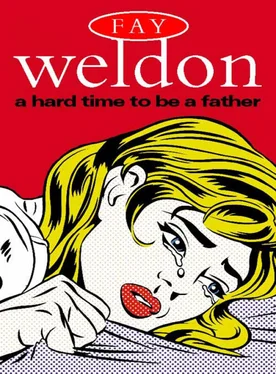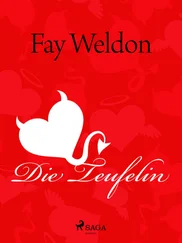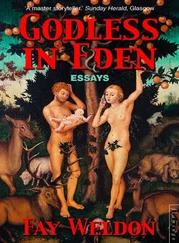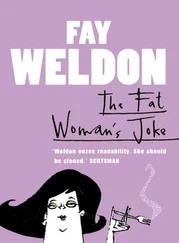‘There goes the future,’ said Stella, without bitterness.
‘My daughter and what they’ve made of her. I’m going up.’
And without further ado, she left the car and vanished through the doors of the apartment block. She left the gun where it was: he was relieved. He had thought perhaps she was on some mission of vengeance. A group of boys, some nine or ten of them, had come out to stare at the BMW. They kept to their side of the road, reverential, passive and well behaved enough. They’d moved aside without protest, to let Stella by.
Lothar found his mouth was dry. He felt trapped. He realised he had no krone, only marks. He wished he could drive. Perhaps when he got back to Berlin he would give up the more extreme of his ecological principles, and take lessons. But would he be going back to Berlin? Past and future seemed to retreat. Supposing this alarming woman asked him to join her in England? What then? He might even accept. In theory, it was easy to work and earn in any European country.
He adjusted the driving mirror the better to see his face. He looked tired: the last couple of nights’ exhaustion showed. He took a compact out of his travelling bag, and opened it: dark blue eye-shadow. He applied a little to his eyelids with his fingers and smoothed it in. The action calmed him: he found people seldom noticed. Now a little mascara on the lashes. Soft, young, dark eyes looked back at him, but they weren’t his, they were out of the side mirror. The boy and his friends had crept up to the car. Now they pointed and laughed, white teeth sharp in wide mouths. He knew enough about vehicles to switch on the BMW’s ignition and close a crack of window, which he saw was open on the driver’s side. With a casual elbow, he triggered the central locking system.
He felt safer. He switched on the radio and stared fixedly ahead. The radio gave him rock music. Making as little movement as he could, he changed the station. Jerome Kern. When he allowed himself to look again the children had retreated to their own side of the street. Hostility now seemed to be mixed with curiosity. Avoid eye contact, he thought. Where were their mothers? Their fathers? Was there no one about to disperse them, send them about their business? Did the police never come down here?
On the fourth floor of the apartment block Miss Oslo opened her front door, thinking it was the dry-cleaning delivery, and saw George’s wife standing there. Most people by the time they arrived up here were panting a little. But Stella’s breath came easily.
‘I didn’t know you were in Oslo,’ said the former beauty queen. She had the sculpted face of so many Scandinavian women past their first youth: the hair scraped firmly back; handsome, all character, no nonsense.
‘I was just passing through,’ said Stella, and laughed. All kinds of things seemed to amuse her.
‘No one goes to Oslo on the way to anywhere,’ observed Miss Oslo. ‘You’ve just missed the others. What a pity! Little Tora went off with his father: they play such good music together. And Karianne’s off with her boyfriend for a couple of days. You should have given us some warning.’
‘It’s you I’ve come to see.’
‘I’m delighted,’ said Miss Oslo, backing into the layers of foliage which broke up the cold clean lines of the apartment. ‘You are always welcome here.’
Nothing was disorderly, nothing was out of place. Even the papers on Miss Oslo’s desk, at which she had evidently been disturbed, were neatly arranged: her reference books evenly placed. Old books. A Small Hut in Bali. The Penang Peninsula in the 1920s: Art and Habitat. Asian Myth, Eurasian Artefact . Distant places, distant years, collected, confined and organised, here in this Northern city.
‘I am not in the least welcome,’ said Stella. ‘I don’t want to be welcome.’
‘Ah, Stella,’ said Miss Oslo, kindly, ‘still the naughty little girl!’
And she made the Englishwoman sharp black coffee and they talked about George’s health and Karianne’s new black lover, and anything other than why Stella was there. Stella enquired about the possibility of marriage between her daughter and the black man, and Miss Oslo laughed and said Stella was old-fashioned: these days in Oslo, marriage was a rare occurrence. ‘But George would like her to,’ said Stella. ‘Or so he wrote and told me.’
‘I didn’t know you and George corresponded,’ said Miss Oslo, taken aback.
‘He writes to me,’ said Stella, ‘when you have an affair, or he’s upset in some way.’
‘How strange,’ said Miss Oslo, ‘that he should turn to you, when he and I can discuss everything freely.’
‘He doesn’t want to discuss,’ said Stella, ‘he wants to complain.’
She went out on to the balcony, and stood there, to look over the frozen park and the hapless ducks, and the city she once knew so well. Miss Oslo came out after her.
‘It’s quite chilly out here,’ she said. ‘Wouldn’t you rather be inside?’
‘I felt I couldn’t breathe in there,’ said Stella. ‘But that’s just Oslo, isn’t it? Airless.’
‘I don’t understand what you mean,’ said the younger woman. ‘Oslo is exceptionally unpolluted for a major city.’
‘Even out here it’s airless enough,’ said Stella, ‘I remember standing here one day while you explained to me how my marriage was over, and George nodded and agreed. I thought I was suffocating. So much sense, so little passion, it was hard to breathe.’
‘It was all for the best,’ said Miss Oslo.
Looking down, Stella could see the shiny roof of the BMW and the children who circled it.
‘Is it school holidays?’ she asked.
‘No,’ said Miss Oslo. ‘All the children are in school. Do come in and finish your coffee. It’s strong, but it’s decaffeinated.’
‘One is always so safe in Norway,’ said Stella, but she didn’t go inside. ‘More and more things to be safe from. Caffeine, nicotine, alcohol.’
‘These things are bad for one, or put others at risk,’ said Miss Oslo primly hovering.
‘These things are beautiful,’ said Stella. ‘It is one’s right to self-destruct before time.’
Miss Oslo’s face stayed blank.
Stella lit a cigarette and puffed. Politeness and distaste warred in Miss Oslo’s face; politeness won: she said nothing. Ash from Stella’s cigarette span in the wind and landed on the soil of a potted plant.
‘You can remove it later,’ said Stella, ‘flake by sinful, uncivilised flake! I see you have a string of nuts hung out for the birds. How kind you are, Miss Oslo; even the birds of the air experience your goodness! But Miss Oslo does not work out what happens next. She is naive. Those you do good to hate you. The birds of the air and the beasts of the earth will eat your crumbs, and return to take everything you have.’
‘I have a deadline,’ said Miss Oslo. ‘An article to deliver by this afternoon. I really have to get back to my desk.
But it was wonderful to see you.’
Stella came back inside, but made no move to leave.
Downstairs in the front of the BMW, Lothar stared fixedly at his knees. The children circled. There must be nearly twenty of them now. There were a handful of girls amongst them now, he noticed, not so good-looking as the boys; they had more crowded, cramped, sullen faces. Surely someone would come along soon. The boy he assumed was the leader – the one he had hoped to draw – drew out a coin and scratched it along the side of the car, slowly and deliberately. The children laughed. Lothar froze. He did not know what to do, or what would happen next.
‘Tell me why you’re here,’ said Miss Oslo.
‘I thought perhaps you’d like to know,’ said Stella, ‘that George has been sleeping with your baby-sitter, Camilla. Sometimes he writes to boast as well as to complain. It happens when you’re away, on your case studies.’
Читать дальше












